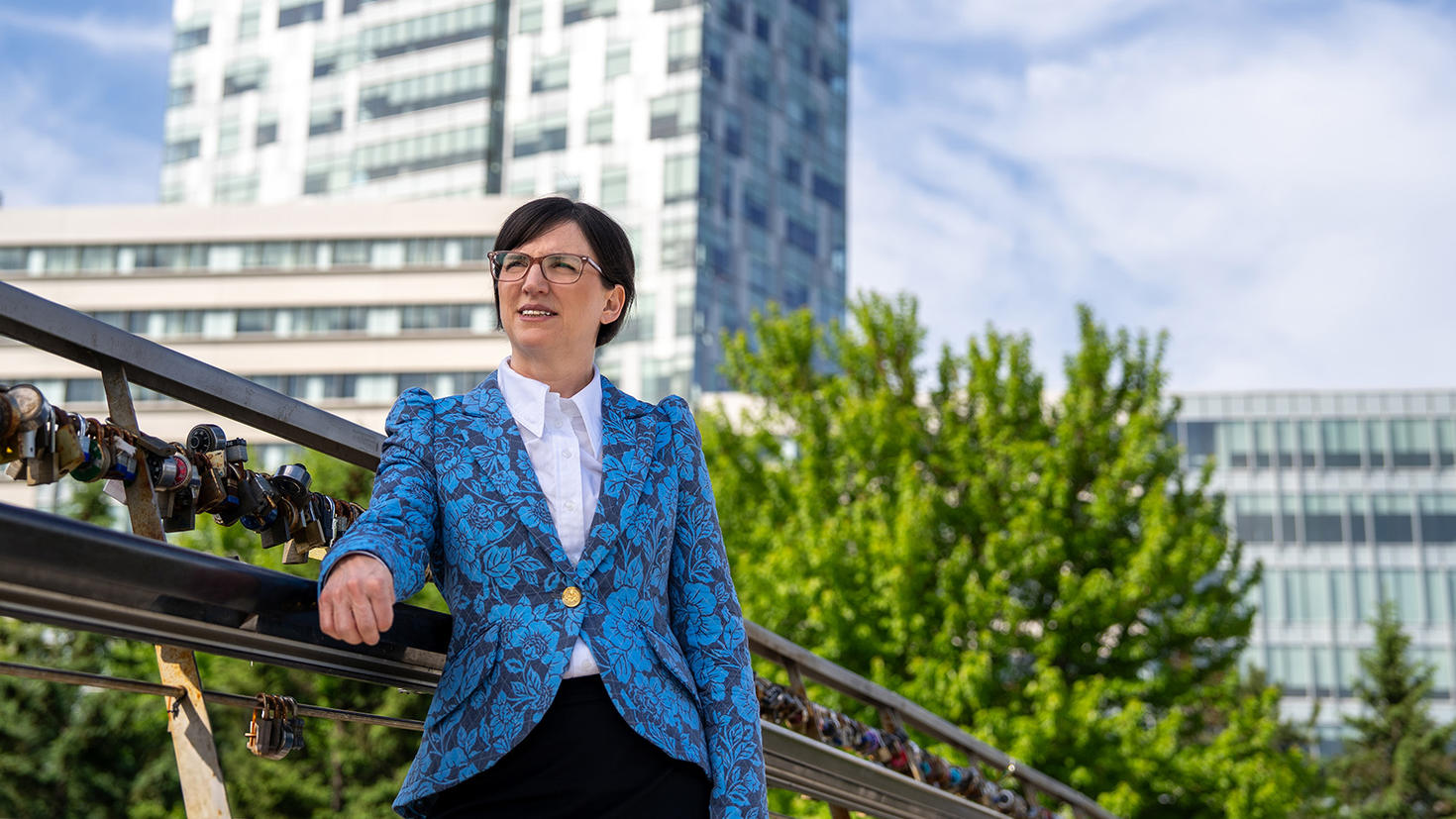Sylvestre’s remarkable academic career — as an Université de Montréal alumna with a master’s and doctorate from Harvard, a professor, a researcher and, then, dean of the Faculty of Law (Civil Law Section) since 2019 — has involved both laying down local roots and building an international profile. At the University of Ottawa, where she has taught for nearly 20 years, she has found a place of lasting engagement, a community that she knows intimately and wishes to mobilize to face tomorrow’s challenges.
She now plans to inspire as a leader here, practising open, inclusive and transparent governance.
A university within society, driven by research and dialogue
For Sylvestre, the University must be rooted in its surroundings, engage in conversations with people, community partners, and public and private sector decision-makers, and meet community needs. She says that this calling is exemplified by the research currently being done at the University, which she calls “outstanding,” both for its growth and for its relevance. Health care, innovation, artificial intelligence, social justice, the environment: the great challenges of our time are at the heart of the research on campus.
A born communicator, Sylvestre says that research intensity must go hand in hand with the capacity for knowledge mobilization. “Our research is rooted in community needs, but it’s not always known.” She therefore would like the University to be seen as a key actor in the region’s social, economic and cultural development.
“I want people in Ottawa to feel at home here,” she adds. She imagines a lively, intergenerational campus, where youth dream of studying, parents of continuing their education or career development, and seniors of returning to share their experience and starting a new stage of learning.
She sees the University of Ottawa as a focal point: a destination for knowledge, but especially for collective transformation.
Three priorities to make a vision of community and openness a reality
Sylvestre is aware of the University’s current budgetary issues and she wants to combine academic ambition and responsible management to ensure uOttawa’s viability. A future-facing institution must rely on a solid base to fully pursue its educational, social and scholarly mission. With this in mind, she intends to involve herself from the start of her term in three major files.
First, she wishes to strengthen links with the community, and plans to meet with partners, governments and communities to build projects equal to our shared ambitions. Mentioning the unique qualities of the national capital — a centre for policy-making, a diplomatic crossroads, a technological hub and a lively cultural space — Sylvestre sees it as an ecosystem that lends itself to enriching the university experience, stimulating research and innovation, and shedding light on society’s major debates.
Her second priority is promoting the Francophonie in all its diversity and vitality. Sylvestre sees it as a focus of our identity and a concrete commitment. She stresses that the University of Ottawa must continue to fully serve Franco-Ontarians and take its place as a leader in knowledge promotion and research in French. Quebecoise by birth and Franco-Ontarian by choice for 20 years, she embodies a francophone life that is both locally rooted and open. As a professor, researcher and dean of the Civil Law Section, she’s led several promising projects, including the French language certificate in Indigenous laws and the Jurivision.ca platform. For her, the francophonie is a driver of innovation, equity and collaboration.
Finally, she plans to offer concrete, lasting support for Indigenous knowledge creation and languages. For her, this requires respect, listening and consistency. She would like to strengthen existing relationships with the Algonquin Anishinabeg nation, support Indigenous research, integrate Indigenous knowledge and languages in programs and encourage Indigenous representation and presence among professors and support staff. “The Indigenous Action Plan proposes good, ambitious ideas. The tuition waiver announced will definitely have a positive impact. Our broader community must continue to implement this plan forcefully.”
Through these priorities, Sylvestre shows her desire to have the University change by relying on its dynamic actors and meeting the needs of all communities in the greater Ottawa region and beyond.
Mobilizing a bold community
And so, what will have changed in a year? Sylvestre hopes that the broader community — on campus, in the city and around the world — will feel the same momentum and enthusiasm that drive her. “I’d like our university to fuel our collective desire to innovate, create and face our society’s challenges.” Sylvestre is the first woman to hold her position in the University’s history, a position she accepts with humility, with all the leading women who’ve inspired and supported her throughout her career in mind.

“I’d like our university to fuel our collective desire to innovate, create and face our society’s challenges.”
Marie-Eve Sylvestre
— Next president and vice-chancellor of the University of Ottawa
The Université de Montréal and Harvard alumna knows that places of learning can open up unexpected pathways, that it’s now her turn to increase the pathways for others. What she’s proposing is a genuine world of possibilities — a place to dare to imagine, create and build. Together.



